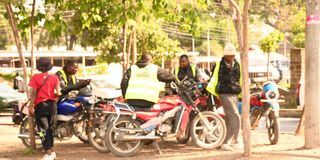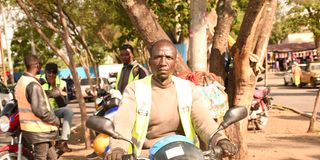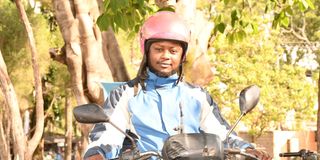The little known organized structure that Nakuru bodabodas operate in

Motorbike riders wait for passengers at one of the stages in Nakuru city.
One Sunday evening, Reitz Mureithi, a Nakuru resident was riding in a matatu from Nairobi to Nakuru.
As she pondered the hassle of heading into Nakuru town to grab a cab, she decided to alight at Free Area instead. It was closer to home and would be cheaper to take a motorbike as she lives in Naka.
"On alighting, I spotted a motorbike conveniently parked nearby hence wouldn't need to walk to the main motorbike stage at Kinuthia Mbugua Road, next to Free Area market," she recalls.
But just as she was about to mount the bike, she noticed a commotion. Several bodaboda riders at the stage began calling out to the rider, approaching with hostility.
Ms. Mureithi quickly realized that members of the motorbike stage were not happy with the lone rider as they seemed aggressive, forcing her to find another motorbike.
Curiosity piqued, she asked her new rider about the incident. He explained that the hostility was due to concerns over impostors robbing customers, tarnishing the reputation of the legitimate motorbike stage.
"Watu wengi wamekua wakiibiwa na watu wanajifanya kua watu wa stage yetu na inatuharibia jina," the rider explained.
He added that they had taken the responsibility of calling out the riders who were not part of their stage to avoid such cases.

James Wasendwa, a motorbike rider in Nakuru city.
Mtaa Wangu conducted a spot check to understand why most motorbike riders in Nakuru have resorted to regulated stages.
James Wasendwa, a rider in the city centre, highlighted the importance of these organizations in enhancing security and accountability. If a customer has a complaint, there is now a sense of order and responsibility.
"In previous years, many motorbike owners were also easily robbed because they didn't know each other well. The organization not only protects customers but also safeguards the riders," Wasendwa revealed.

John Kiarie, chairman of the motorbike stages around the Regional Commissioner's office in Nakuru city.
John Kiarie, chairman of the stages around the Regional Commissioner's office explains the process of starting a new stage. Members must report to the county government, notify them of the number of members, and pay a parking fee to operate.
"To be a member of any stage, one must pay a fee based on the location. For example, at our stage, you need to buy space for Sh. 20,000," Kiarie notes.
Kiarie reveals that despite having many motorbike stages in town there's an unwritten rule of not carrying pillions from a stage that you've not paid for.
"Carrying pillions from a different stage will lead to conflicts between the riders so everyone has to respect and honour the unwritten rule," he concludes.

